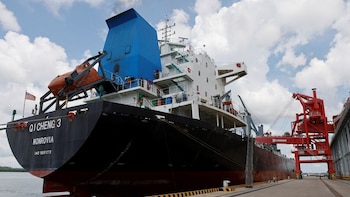
(ATR) Japan is topping the podium when it comes to issues in getting a new Olympic stadium built.
The latest kerfuffle involves the Olympic Cauldron – or rather, the lack of one – in the latest design for the showpiece venue of the 2020 Summer Games.
Officials admitted a lack of communication between the government and the various other parties involved. Olympics and Paralympics Minister Toshiaki Endo admitted "In ministerial conference, we didn’t discuss the installation location of Olympic Cauldron."
To correct the oversight, the 2020 Tokyo Olympic Committee held a coordination meeting with Tokyo representatives and government agencies on Thursday Mar. 3.
Endo, in a press conference after the meeting, said he will lead a discussion team and that the cauldron location would be decided by May when the basic design of the new National Stadium is determined.
Complicating matters in choosing a location is that according to some reports, the cauldron can’t be located in the upper part of the stadium because of Japan’s fire protection laws.
IOC requirements call for the cauldron to be placed where "all spectators in the stadium" can see it as well as it being seen by "people outside the stadium as much as possible." The final installation location requires the approval of the IOC.
The cauldron’s location could end up raising the cost of stadium construction, which has already proved to be a headache for Tokyo organizers. If the basic design of the stadium is changed for the cauldron, it could greatly influence construction cost and create yet another issue for the new national stadium.
The original design for the stadium by architect Zaha Hadid was first scaled down by organizers in 2014 to reduce construction costs. The project was then scrapped entirely by Japanese Prime Minister Shinzo Abe in July 2015 due to cost projections that still exceeded the planned budget.
Architect Kengo Kuma’s design was chosen in December to be the centerpiece of the 2020 Games. A partnership with construction giant Taisei Corp, the 68,000-seat stadium will cost $1.26 billion, nearly one billion less than the original design. The Japanese government has also agreed to cover $320 million of construction costs, one-fourth of the total price tag.
The 2020 Olympic stadium will be built on the site of the 1964 Tokyo Games venue. Construction is set to begin in early 2017 with completion due in late November 2019.
Reported by Shusuke Hirata and Kazuya Yokooin Tokyo
For general comments or questions,click here.
20 Years at #1: Your best source of news about the Olympics is AroundTheRings.com, for subscribers only.
Últimas Noticias
Utah’s Olympic venues an integral part of the equation as Salt Lake City seeks a Winter Games encore
Utah Olympic Legacy Foundation chief of sport development Luke Bodensteiner says there is a “real urgency to make this happen in 2030”. He discusses the mission of the non-profit organization, the legacy from the 2002 Winter Games and future ambitions.

IOC president tells Olympic Movement “we will again have safe and secure Olympic Games” in Beijing
Thomas Bach, in an open letter on Friday, also thanked stakeholders for their “unprecedented” efforts to make Tokyo 2020 a success despite the pandemic.

Boxing’s place in the Olympics remains in peril as IOC still unhappy with the state of AIBA’s reform efforts
The IOC says issues concerning governance, finance, and refereeing and judging must be sorted out to its satisfaction. AIBA says it’s confident that will happen and the federation will be reinstated.

IOC president details Olympic community efforts to get Afghans out of danger after Taliban return to power
Thomas Bach says the Afghanistan NOC remains under IOC recognition, noting that the current leadership was democratically elected in 2019. But he says the IOC will be monitoring what happens in the future. The story had been revealed on August 31 in an article by Miguel Hernandez in Around the Rings

North Korea suspended by IOC for failing to participate in Tokyo though its athletes could still take part in Beijing 2022
Playbooks for Beijing 2022 will ”most likely” be released in October, according to IOC President Thomas Bach.




